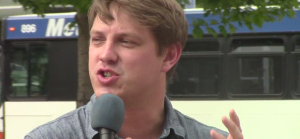Why are minimum wage hike advocates so stingy?

By Ryan Ekvall | Wisconsin Reporter
MADISON — Why so stingy, minimum wage hike advocates?
“We’re working to pass a referendum this fall calling for an increase in the statewide minimum wage to $10.10,” Peter Rickman, #raisethewage rally organizer, told me Thursday on the Capitol square.
That’s it? All the “Hey-hey, ho-ho, poverty wages have got to go” chanting for salaries of less than $20,000 a year? That might cut it for gas and Lollapalooza ticket money for a teenage suburban burger flipper. But what about a parent trying to raise a family?
Why not $20 an hour? Or better yet, $30 an hour.
The ultimate goal, Rickman assured me, is a $15-an-hour minimum wage.
Wisconsin Jobs Now organizer Peter Rickman says $15 is a more legitimate minimum wage than $16 or $17 an hour.
That’s more than twice the $7.25 an hour minimum wage earners, who make up 4.3 percent of the workforce and 2.7 percent of the workforce over age 25, earn now.
But raising a family of four on less than $30,000 a year still seems pretty difficult. Especially if you have to give up welfare benefits and try to keep up with the prices business owners will have to increase to cover the increased labor costs the minimum wage will impose upon them.
“Well, $15 is a legitimate figure,” Rickman said.
He couldn’t tell me what made $15 more legitimate than, say, $16 or $17 an hour.
Only “right wing plants” are talking about a minimum wage greater than $15 an hour, he said. Certainly not the “left wing plants” funded by Service Employee International Union in the Wisconsin Jobs Now organization that sponsored the rally.
Democrats participating in the #livethewage gimmick could have settled the issue in 2009 when they controlled Congress and the presidency. Texas Democrat Al Green introduced a living wage bill that would adjust every four years based on the federal poverty level.
The bill died in committee.
Rickman insisted these protesters were “not a group of Democrat apologists,” although Wisconsin Jobs Now previously admitted pushing to get nonbinding minimum wage referenda on county ballots in November as an enticement to voters needed to oust Gov. Scott Walker.
“The truth is in 2009 we didn’t have a mass movement of low wage workers demanding higher wages,” Rickman said. “We didn’t have huge numbers of low wage workers organizing for $15 and a union taking it to the streets.”
Maybe low wage earners just weren’t that into making more money then. Or they had not yet been exposed to the infectiously persuasive community organizer chants of “Fif-teen, fif-teen, make that minimum fif-teen.”
For whatever reason, they rallied Thursday, serving up the same old elixir: one part social justice, one part political theater and two parts economic ignorance, but this one with a twist.
Instead of loitering outside a fast food restaurant, the 30 or so protesters marched from the Capitol, down East Washington Avenue on to the Wisconsin Manufacturers and Commerce building. They might as well have leapt into the Lord of the Rings trilogy and stormed Mordor.
The Manufacturers and Commerce lobby, Rickman said, posed the greatest obstacle to increasing the minimum wage in Wisconsin. When I asked, Rickman said getting their “living wage” petitions in the hands of WMC big wigs was not part of their plan.
“We’d talk to someone,” he said. If anyone came out of the building. Given that the protesters arrived nearly an hour after business hours, no one accommodated them.
“We weren’t aware the protest was planned,” Kurt Bauer, president of WMC, said in an email to me. “No permission was sought, nor was it given.”
Staff may not have been surprised. Demonstrations on their private property were becoming more common and employees were growing used to them, Bauer said.
Rather than dialog, one demonstrator set up a portable public address system near the front steps of the WMC building. A rabbi, a former Taco Bell employee and a community organizer took turns stepping up to the microphone.
None of the three mentioned government and unions colluding to use minimum wage laws to keep minorities and immigrants from competing for jobs.
Not one of them brought up studies showing increases in black teenage unemployment when government increases the minimum wage. Not a word was spoken of the 500,000 jobs that would be lost to a $10.10 an hour minimum wage, as the Congressional Budget Office projects.
“I do find it sadly ironic,” Bauer said, “that a group that claims to want Wisconsin jobs now supports government mandated wage increases that studies show either leads to fewer jobs or reduced hours, especially among young and lower skilled/entry level workers.”







